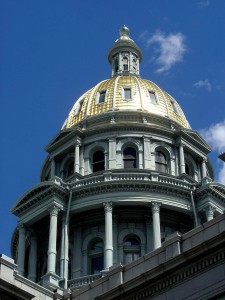UPDATE: Was Republican opposition to the budget busting long bill “sour grapes”? Oh contraire mon frere. Per a press release from Senate Republicans:
Denver- Today, Senate Democrats passed Senate Bill 213 on a party line vote, asking voters to approve a one billion dollar tax increase without reforms that improve student achievement.
“Just one week after Senate Democrats approved a historic budget that increases government spending at three times the rate of inflation, the voters will be faced with a one billion dollar tax increase,” said Assistant Senate Minority Leader Mark Scheffel (R-Parker) and member of the Senate Education Committee. “We need a student centered system that emphasizes improving student outcomes and instilling teacher accountability instead of perpetuating the present system that merely asks for more money without solving the problem.”
This year’s budget is set to be the first in a number of years not receiving a bipartisan blessing. Governor Hickenlooper and legislative Democrats’ left-wing agenda outside the budget process has no doubt poisoned the bipartisan well, but it doesn’t mean there aren’t clear reasons to oppose this year’s budget.
Sorry, Singleton, “sour grapes” are not the reason Republicans are opposing this year’s spending monstrosity.
It’s unfortunate for Governor Hickenlooper, as he has loved to trot out the line about Colorado’s bipartisan budget process. Here’s how Hickenlooper characterized last year’s bipartisan budget:
“The budget provides a comprehensive and thoughtful allocation of taxpayer dollars,” Hickenlooper said at the signing ceremony. “The support that both parties in both houses gave to the budget demonstrates that we’re trying to find the right compromise.”
Does the lack of support from one party then demonstrate the lack of compromise in this year’s budget, Governor?
Aside from political reasons, here’s five reasons why Republicans will and should oppose this year’s budget:
1) Medicaid expansion: The budget expands Medicaid spending to unsustainable levels. The last time Medicaid was expanded in Colorado, in 2009, this is what happened by 2011, per The Denver Post‘s Tim Hoover:
Two years after lawmakers expanded Medicaid to cover poor adults without children, the state is vastly scaling back the program because the number of people eligible for coverage is nearly three times as high as first projected and the cost of insuring them is almost nine times original estimates.
2) Big raises for bureaucrats: Despite a sluggish economy with unemployment over 7%, Democrats are proposing giving government workers a 2% salary increase.
3) Spending rising at three times the rate of inflation: While inflation has gone up 1.9%, the Colorado budget for FY 2013/2014 is 6.7% higher — or more than three times the rate of inflation. Responsible spending that is not.
4) More Money for GEO: Despite the massive and embarrassing boondoggle that the Governor’s Energy Office (GEO) has been — spending a quarter billion dollars it couldn’t track – the budget allocates more money for the failed enterprise. Why bother reining in a government program when it feels so good to say you’re supporting renewable energy?
5) Ignores Problems at PERA: The Public Employee Retirement Association (PERA) has an unfunded liability of $26 billion and this year’s budget does nothing to address that. It’s not sour grapes to worry about that.
Ultimately, if Democrats are not going to address the serious problems outlined above — and those are just some top line concerns — then Republicans have no reason to support the budget.
The budget debate comes down to the serious differences between the two parties. For Republicans, this year’s budget spends too much. For Democrats, it’s not enough.
Like a crackhead’s eternal dilemma, it’s never enough.
Despite the fact that the budget crossed $20 billion this year and is set to rise to over $22 billion next year, Democrats still want more. A billion more, in fact, if Senator Mike Johnston gets his way.
Warm, fuzzy talking points about bipartisanship aside, with a policy divide this wide on spending we don’t foresee a bipartisan kumbaya on the budget coming any time soon.


Trackbacks/Pingbacks